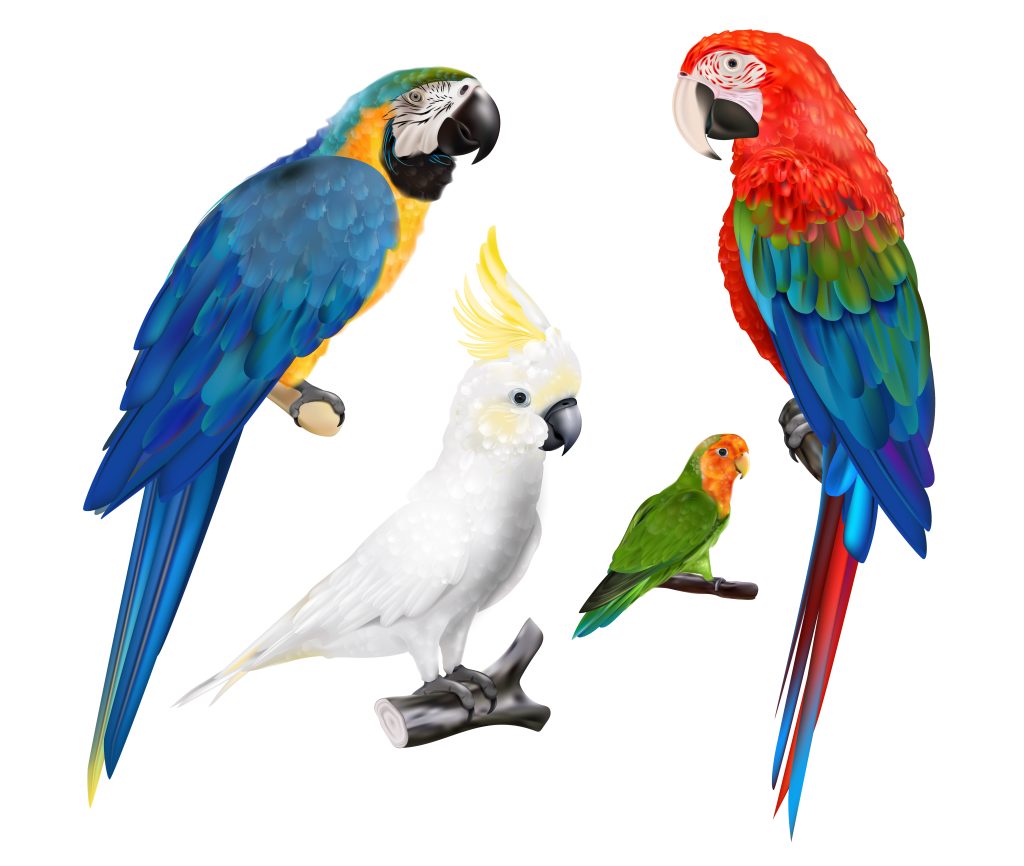Are you considering adding a parrot to your family and wondering if they’re the right pet? Then this article will be of interest to you. Parrots can be wonderful and fun companions, they are social, you can teach them things, and some may even learn to talk. But as with all types of pets, they also come with their own set of challenges and needs. So if you’re wondering whether a parrot is the right pet for your family, keep reading.

Commitment & Time
Before we start, it’s important to know that there are many types of parrots. There are the bigger ones that most people know, such as the Macaw, African Grey, and Cockatoo. And there are smaller parrots, such as the budgie, cockatiel, and lovebirds. When choosing a parrot, it’s important to pick a type that fits your family to prevent disappointment, and, in the worst case, rehoming.
Depending on the type of parrot, they can reach considerable ages. The larger varieties can even live up to 30–50 years. This means you may have your pet parrot for life. If this commitment scares you, choose a bird with a lower expected lifespan, such as the budgie, which with proper care can live up to 7–15 years. If that still feels like too long of a commitment, another type of pet with a shorter lifespan might suit you better.
All parrots are incredibly social and smart, and many can be taught really cool tricks and can be a friend for life. This intelligence and their social nature does mean they need company and enrichment to stay happy, live a fulfilled life, and prevent stress. Parrots are flock birds, but most larger parrots do quite well with you as their flock. This does mean that leaving your parrot alone for extended periods and/or not providing enough enrichment activities will lead to behavioral issues. It’s not uncommon for larger parrots to self-mutilate if they don’t receive the care and attention they need. Having a parrot is very much like having a young child, except they stay in that stage of life for their entire life expectancy. They need a fair share of attention when kept without a companion, and if you’re away for longer hours, keeping a single bird may not be suitable.
When you can’t offer that amount of time, having a couple of parrots may suit your lifestyle better, as they can keep each other company. Generally speaking, smaller parrots often do better if they have a buddy. More birds, however, means more costs, more mess, and more noise. It’s also said that it can be harder to bond with your parrot if they already have a bird companion. Choose wisely which type of parrot to get, depending on your own lifestyle, while keeping the bird’s needs in mind as well.
Cost
As with all pets, costs are important to consider. Parrots are exotic animals and require specialized care at the vet, which not every veterinarian can offer. This specialised care often comes at a price, and you may need to travel long distances to find a vet that knows how to treat birds.
Besides veterinary care, there are the daily costs of upkeep. Even though it’s best for your parrot to be out of its cage as much as possible, you will still need one to keep them safe if needed. The bigger the cage, the better, and it needs to be made of safe materials, as most birds will chew on the wires.
Then there is the cost of toys, enrichment materials, and daily feeding, which when done right will be a fair expense. Be sure to research the diet your type of parrot needs online, as many people feed unsuitable, easy to find and buy diets to their parrot, such as sunflower seeds. Many health issues seen in parrots are due to being fed an unsuitable diet.
Living space
Parrots are often messy and create a lot of dust, which is something you need to keep in mind if you’re sensitive to it. Their cage, items, and living area will need to be cleaned frequently.
Parrots by nature are incredibly noisy, they use calls and screams in the wild to communicate with each other. Many parrots, especially the larger ones, have powerful voices that can be heard over long distances. These sounds might be a problem if you have neighbours. If you, and/or your neighbours, like peace and quiet, a (large) parrot isn’t the pet for you as most of them tend to scream, whistle, mimic sounds, shriek, and talk.
All parrots need time out of their cage, the more, the better. They need it to exercise, spread their wings, and explore. This exploration often includes the use of their beaks, and especially the larger varieties have very powerful ones. It’s important to bird-proof the area your parrot can access. Besides the fact that items may end up destroyed, like chewing on wooden furniture, or the wallpaper being ripped off the wall, many things around the house can be dangerous to your parrot, such as toxic plants.
Also keep in mind that parrots are extremely sensitive to fumes, and they should never be kept where cooking fumes can reach them. For example, fumes from non-stick coated pans can be deadly to them.
Kids and Other Pets
Parrots and kids don’t always go well together. They may become best friends, or your parrot may not like them at all. Parrots often bond with a select few people. Young kids can also be frightening to your parrot, as they often tend to make sudden movements and loud noises, which can lead to defensiveness and aggressive behaviour in your parrot. You should never leave your child unsupervised with your parrot.
Parrots are also not always compatible with other pets, although exceptions do exist. Dogs and cats can harm or even kill your parrot if their instinct to chase gets triggered. Your parrot may also hurt them by biting. Additionally, a cat’s mouth and claws (and those of other animals such as ferrets) contain a bacteria called Pasteurella, which can cause infection and death in your bird if they get scratched.
Rejection
Unlike dogs and cats, who in most cases are programmed to bond with humans, this is not the case with parrots as they are wild animals. And while most birds will often show you love and respect if you give this to them, this is not a given. Parrots are often extremely picky about who they bond with, and they can even become hostile toward those they dislike.When getting a parrot for the family, one should be prepared for the fact that they may not bond with all family members.
Conclusion
So, is a parrot the right pet for you? That depends on your lifestyle, your time, and your ability to adapt to their needs. Parrots can be amazing, funny, intelligent companions , but they’re not low-maintenance, and they’re definitely not a good fit for everyone. If you’re ready for a long-term commitment, plenty of noise, a bit of mess, and a whole lot of personality, a parrot might just be your perfect match. If that doesn’t sound quite right, there are plenty of other types of pets out there who might suit you better.
Would you like to know more about our pet sitting service? Feel free to send us a DM we will be happy to help.

